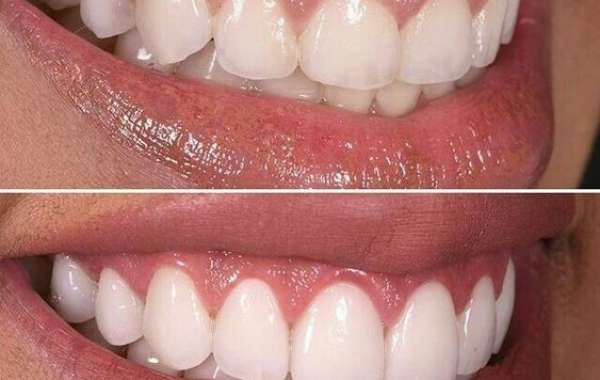If you reside in St Albans and are considering composite bonding, this comprehensive guide will cover everything you need to know—from the procedure itself to its benefits, costs, and aftercare.
What is Composite Bonding?
Composite bonding is a cosmetic dental procedure that involves applying a tooth-colored resin material to teeth in order to improve their appearance. This versatile treatment can address various aesthetic concerns, including:
Chips and cracks: Repairing minor damages to teeth.
Discoloration: Covering stained or discolored teeth.
Gaps: Filling in gaps between teeth for a more even smile.
Misshapen teeth: Reshaping teeth to enhance their overall appearance.
The composite resin used in bonding is a durable, plastic-like material that can be sculpted and polished to match the natural color and shape of your teeth.
The Composite Bonding Procedure
The composite bonding procedure is generally straightforward and can often be completed in a single visit to your dentist. Here’s a step-by-step breakdown of the process:
Consultation
The first step is to schedule a consultation with your dentist in St Albans. During this appointment, the dentist will assess your dental health, discuss your cosmetic goals, and determine if composite bonding is the right solution for you. They may take X-rays or photographs to analyze your teeth and plan the procedure accordingly.
Tooth Preparation
On the day of the bonding procedure, the dentist will begin by preparing the tooth or teeth to be treated. This involves lightly etching the surface of the tooth to create a rough texture, which helps the composite resin adhere better. The dentist may also apply a conditioning liquid to enhance bonding.
Application of Composite Resin
Next, the dentist will apply the composite resin in layers. They will carefully mold and shape the resin to match the natural contours of your tooth. This stage requires precision and artistry to ensure that the final result looks natural.
Curing the Material
Once the resin is in place, the dentist will use a special light to cure (harden) the material. This step typically takes only a few seconds, and the dentist will continue to add and cure additional layers until the desired shape and thickness are achieved.
Final Touches
After the composite has been cured, the dentist will shape and polish the bonded material to ensure a smooth finish that blends seamlessly with your natural teeth. The result is a restored tooth that looks and feels natural.
Post-Procedure Instructions
Before you leave the clinic, your dentist will provide you with post-procedure care instructions, ensuring that you know how to take care of your newly bonded teeth.
Benefits of Composite Bonding
Composite bonding offers numerous advantages for individuals seeking to enhance their smiles. Here are some key benefits:
Aesthetic Appeal
Composite bonding materials are available in various shades, allowing dentists to match the resin to your natural tooth color. This results in a seamless and aesthetically pleasing appearance.
Minimally Invasive
Composite bonding is a minimally invasive procedure that typically requires little to no tooth enamel removal. This means less discomfort and a quicker recovery time compared to more extensive dental procedures.
Quick Results
Most composite bonding procedures can be completed in a single appointment, making it a time-efficient option for busy individuals who want to enhance their smiles quickly.
Cost-Effective
Compared to other cosmetic dental procedures like veneers or crowns, composite bonding is generally more affordable, making it accessible to a wider range of patients.
Versatility
Composite bonding can address a variety of dental issues, from minor cosmetic enhancements to more significant repairs, making it a versatile option for many patients.
Durability
While composite bonding is not as durable as some other options, such as crowns or porcelain veneers, it can last several years with proper care. Regular dental check-ups will help ensure that your bonded teeth remain in good condition.
Considerations Before Getting Composite Bonding
While composite bonding offers many benefits, there are some considerations to keep in mind:
Not Suitable for All Issues
Composite bonding is ideal for minor cosmetic changes but may not be the best option for severe dental issues, such as extensive decay or structural damage. In such cases, your dentist may recommend other treatments, such as crowns or root canals.
Staining Potential
Composite resin can stain over time, especially if you consume coffee, tea, red wine, or tobacco. While the material is resistant to staining, it may not maintain its original color indefinitely.
Maintenance
While bonded teeth are durable, they require regular maintenance. Good oral hygiene practices—such as brushing, flossing, and regular dental check-ups—are essential to prolong the life of the bond.
Cost of Composite Bonding in St Albans
The cost of composite bonding can vary significantly based on several factors, including:
The complexity of the procedure: More extensive work may increase the cost.
The dentist’s experience: Highly skilled or specialized dentists may charge more for their services.
Geographic location: Prices may differ depending on the region, with urban areas like St Albans potentially having higher rates.
On average, the cost of composite bonding in St Albans can range from £200 to £500 per tooth. It's essential to consult with your dentist to receive an accurate estimate based on your specific needs and treatment plan. Some dental clinics may offer payment plans or financing options to make the treatment more accessible.
Aftercare Tips for Composite Bonding
Proper aftercare is crucial to ensure the longevity of your composite bonding. Here are some essential tips to follow:
Maintain Good Oral Hygiene
Brush your teeth at least twice a day and floss daily to prevent plaque buildup and maintain overall oral health. Use a soft-bristled toothbrush and fluoride toothpaste to avoid damaging the bonded material.
Avoid Staining Foods and Drinks
While composite resin is somewhat stain-resistant, it's best to limit your consumption of staining substances like coffee, tea, and red wine. If you consume these, rinse your mouth with water afterward to minimize staining potential.
Be Mindful of Hard Foods
Avoid biting down on hard foods, ice, or using your teeth as tools, as this can chip or damage the composite material. Cut foods into smaller pieces when necessary.
Regular Dental Check-ups
Schedule regular dental check-ups to monitor the condition of your bonded teeth and address any issues before they escalate. Your dentist can also professionally clean the bonded area to help maintain its appearance.
Consider a Night Guard
If you grind your teeth at night (bruxism), talk to your dentist about getting a night guard. This protective device can help prevent damage to your bonded teeth.
Choosing a Dental Clinic for Composite Bonding in St Albans
When seeking composite bonding in St Albans, it's essential to choose a reputable dental clinic with experienced professionals. Here are some factors to consider:
Qualifications and Experience
Research the qualifications, training, and experience of the dental professionals at the clinic. Look for dentists who specialize in cosmetic dentistry or have extensive experience in performing composite bonding procedures.
Reviews and Testimonials
Read reviews and testimonials from previous patients to gauge the quality of care provided by the clinic. Positive feedback can help you feel more confident in your choice.
Consultation Process
Choose a clinic that offers a thorough consultation process. This ensures that your dentist understands your goals and can develop a personalized treatment plan tailored to your needs.
Technology and Techniques
Inquire about the dental technology and techniques used at the clinic. Modern equipment and materials can enhance the quality and outcome of your composite bonding procedure.
Cost Transparency
Look for a clinic that provides transparent pricing and detailed explanations of treatment costs. This will help you avoid any unexpected fees.
Conclusion
Composite bonding is a valuable cosmetic dental treatment that can enhance your smile by addressing various aesthetic concerns. If you are considering composite bonding in St Albans, understanding the procedure, benefits, costs, and aftercare is essential to making an informed decision. With proper care and maintenance, composite bonding can provide you with a beautiful, natural-looking smile that boosts your confidence for years to come.
Whether you’re dealing with minor chips, gaps, or discoloration, composite bonding could be the right choice for you. Consult with a skilled dental professional in St Albans to explore your options and start your journey toward a more radiant smile!




